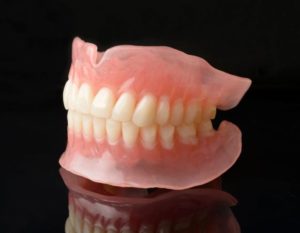
Dentures are a suitable tooth replacement solution for millions upon millions of people who have suffered some tooth loss. You can expect your new prosthetic to look good, fit well, and restore a degree of chewing power. However, its secure fit will not last indefinitely. At some point, you will need to get your dentures adjusted (relined). Read on to learn what to expect during the denture reline process.
Do You Need a Reline?
Most people require a denture reline every 1 – 2 years. This is necessary because as soon as the natural teeth are extracted, the human body begins to resorb the jawbone that once supported them. Eventually, this resorption reaches the point where shape of the bone significantly changes, meaning that a denture will lose its original fit.
Some signs that you may need to visit your dentist for this service include:
- Your dentures feel loose or uncomfortable.
- Your gums are sore because your dentures no longer fit well.
- You are using more adhesive than you used to in order to keep your dentures in place.
What to Expect with the Reline Process
During a denture reline, material is added to the base of your dentures, to the area that normally touches your gums. This creates a more secure fit and can allow you to continue using your prosthetic for as long as possible before you have to replace it altogether.
There are two types of denture relines. Here is a brief overview of the process for each:
Hard Reline
A hard reline involves adding hard acrylic to the base of your denture. Your dentist will use a soft putty material to map out the changes that need to be made, and then acrylic will be added. This process may take place in your dentist’s office, or it may be outsourced to a nearby laboratory.
Hard relines tend to be quite durable. They often last for two years or so.
Soft Reline
Rather than using acrylic, a soft reline involves the use of a resin material to build up a denture’s base. This technique is often used for patients with sensitive gums or those who recently underwent oral surgery. The results tend to be more comfortable than what is commonly experienced with a hard reline. Soft relines are usually quite quick and can be completed in your dentist’s office in less than one hour.
The biggest disadvantage to a soft reline is that it is not as durable as a hard one, which can necessitate more frequent trips to your local dental practice.
The denture reline process is simple and straightforward for most patients. It can keep your smile in the best shape possible!
Meet the Practice
New Haven Dental Group in Branford, CT, is proud to offer a full range of oral care services to our community, including dentures, denture maintenance, and more. If you are struggling with an ill-fitting prosthetic, our team would be pleased to help you find a solution. Reach out to our office at 203-439-6895.
